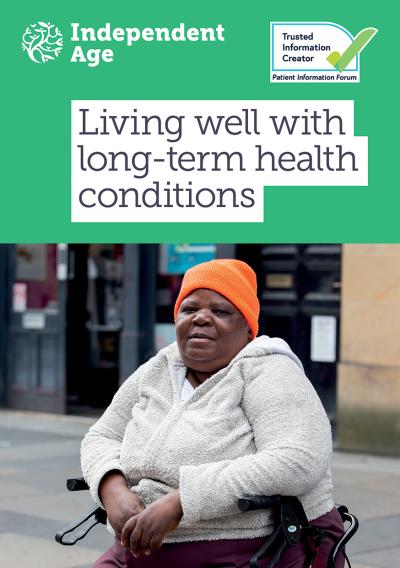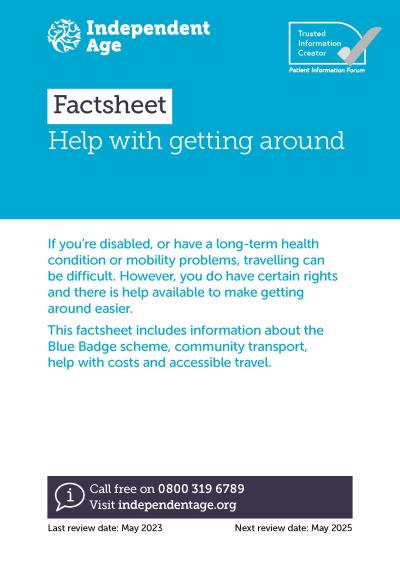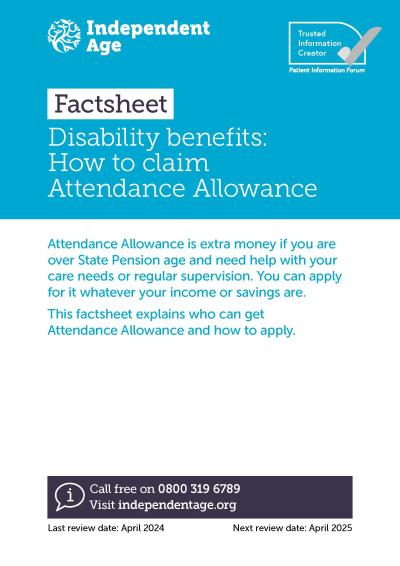Related publications

Living well with long-term health conditions

Help with getting around

If you have a disability or health condition that affects your walking, or you have a hidden disability such as dementia, autism or Parkinson's, you may be able to get a Blue Badge to help you park closer to your destination.
With a Blue Badge, you have certain on-street parking concessions and some parking restrictions may not apply to you. You can have a Blue Badge if you’re a driver or a passenger. It usually lasts up to three years. You can use your Blue Badge with any car, including taxis.
Concessions usually include:
You can't use your Blue Badge everywhere. Your local council can tell you where you can park.
You automatically qualify for a Blue Badge if at least one of the following applies to you:
There are other circumstances under which you may qualify for a Blue Badge. For more information, contact our Helpline (0800 319 6789) to arrange to speak to an adviser.
If you don't automatically qualify, you may still be able to get a Blue Badge if any of the following applies:
This list doesn’t cover every situation. You can find more information about who may be able to get a Blue Badge on the government websites for:
The Blue Badge scheme is run by your local council. If you don't automatically qualify, you’ll have to provide extra information. This could include details of any medication you take, treatments you receive and letters from health professionals. The council may assess you to decide if you’re eligible. They may ask you how your condition affects your walking or how it affects journeys between your vehicle and where you want to go.
Contact your local Citizens Advice for help to apply. If the person you drive has dementia, Alzheimer’s Society or Alzheimer Scotland can give you advice on how to make an application.
The badge and its concessions are for your use only. Someone else can use it if they are picking you up or dropping you off, but you can’t lend it to someone to go to do shopping for you, for example.
If you no longer need the badge or the badge has expired, you must return it to the council – if you don't, you could be fined up to £1,000.
You can apply for a Blue Badge online. In England and Wales, some councils may also let you apply on a paper form – contact your local council to check.
In Scotland, if you are applying for a Blue Badge because you have a mental condition that means you lack awareness about the dangers of traffic, you cannot apply online. You must contact your local council for a paper application form.
Don’t apply for a Blue Badge from anywhere else. If another organisation is offering a Blue Badge, it’s probably a scam.
When you apply for or renew a Blue Badge, you will need:
If you apply online, make sure you have the information to hand before you start. If you make a paper application, send copies of any documents, not the originals. Your council may only accept paper applications with certified copies of your documents. In this case, you will need to get your copies certified by a professional, such as a solicitor, who will verify your documents. They may charge for this.
It can take up to three months to process your application, depending on your council and whether you need an assessment. Ask them how long it’s likely to take.
If you have a life-limiting illness, your application may be fast-tracked.
Your council should tell you why you don't qualify. You can ask them to look at their decision again if you think they haven’t considered some important information about you. You can also reapply if your disability or health condition becomes more serious.
If you need help to appeal, contact your local Citizens Advice.
Parking rules differ from place to place. You should contact the local council to find out where you can use your Blue Badge and what the restrictions are.
The Blue Badge is designed for on-street parking only. Places like hospital and supermarket car parks or private roads – at airports, for example – will have their own rules.
You may not have to pay full fare at certain river crossings, bridges and tunnels but you may have to apply in advance. You can find more information on Gov.uk.
In London, you don’t have to pay the Congestion Charge if you are a Blue Badge holder but you must register with Transport for London for the 100% discount first. You may be exempt from charges in other major cities. Make sure to check with the transport authority for the city before travelling.
You can use a Blue Badge throughout Europe to get the same concessions that are available to local citizens. There are no arrangements with countries outside the EU, so you’ll have to find out about local concessions before you go.

You can find the contact details of your local council at gov.uk/find-local-council.
Read more about the Blue Badge scheme and your responsibilities:
England – Gov.uk
Scotland – Mygov.scot
Wales – Gov.wales.
Our factsheet Help with getting around has more information about the support available if you're disabled or have a long-term health condition.